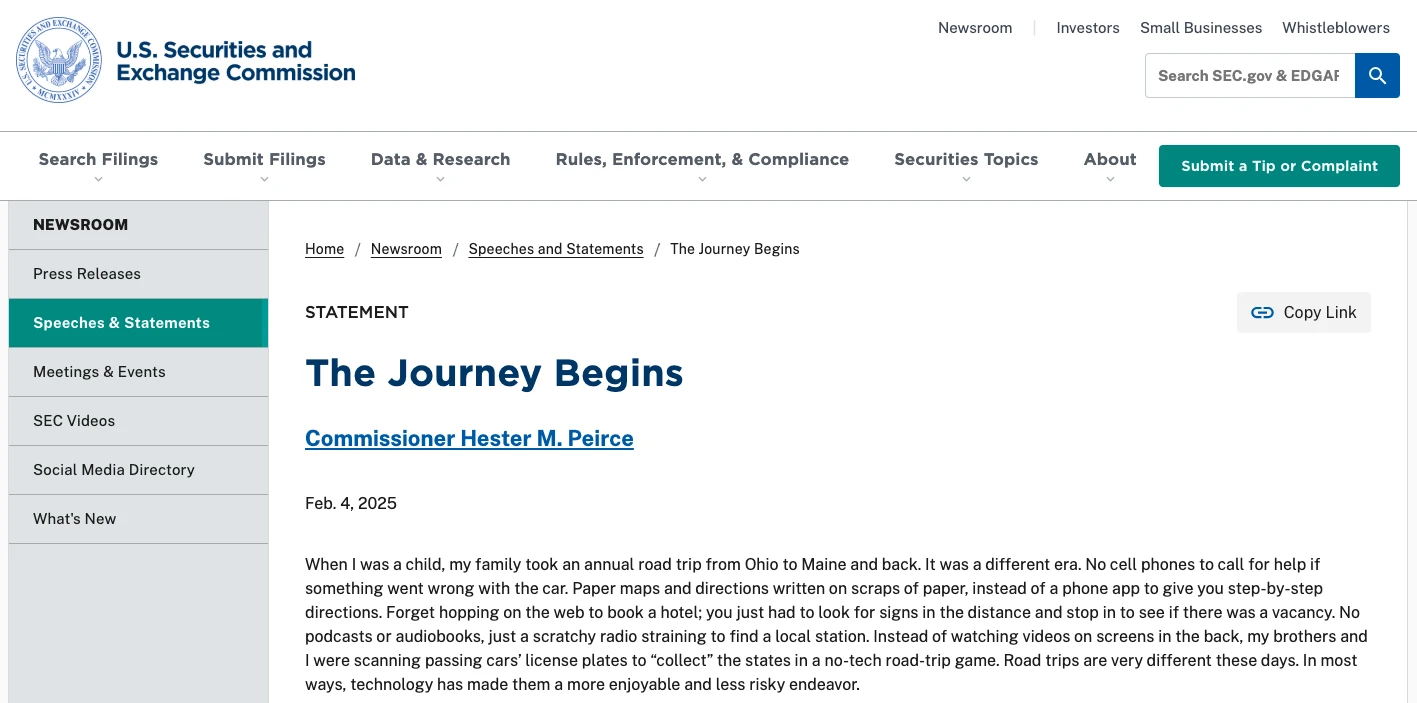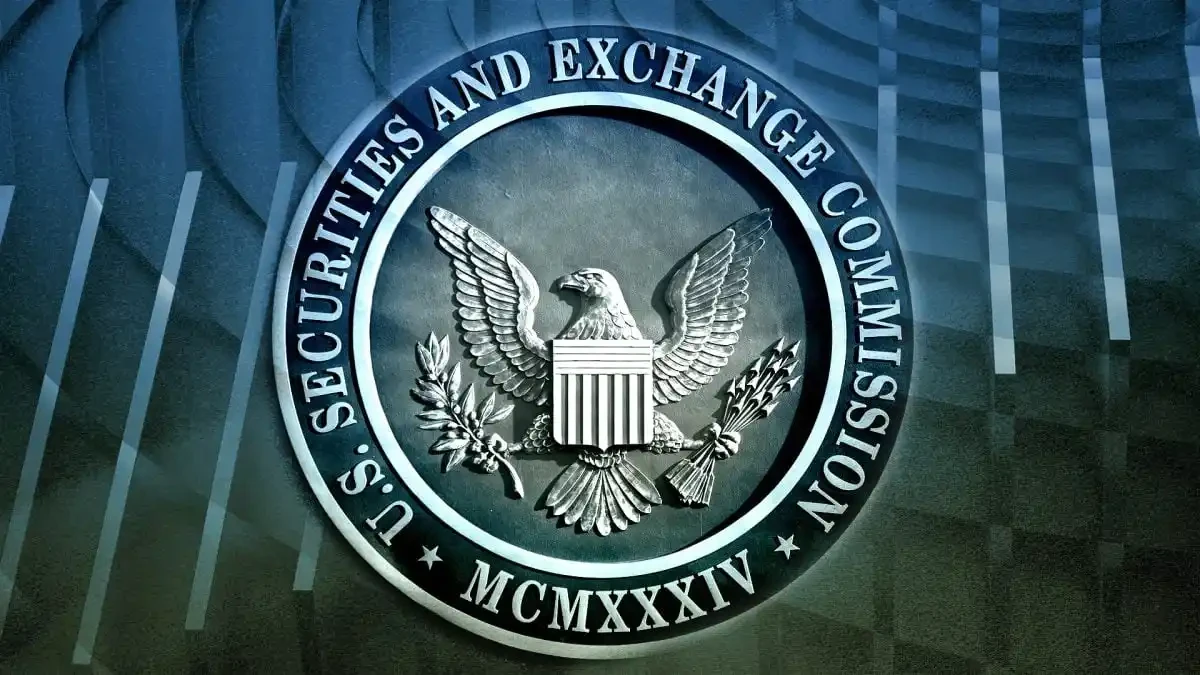On February 4, 2025, the U.S. Securities and Exchange Commission (SEC) released a work plan for its Cryptocurrency Working Group, marking an important transition in the U.S. cryptocurrency regulation. The working group aims to bring more clarity to the regulatory framework for crypto assets while maintaining support for innovation. Over the past decade, the SECs performance in cryptocurrency regulation has often been criticized, mainly due to a lack of clear rules and uncertainty in enforcement. The newly established working group hopes to guide the cryptocurrency industry toward a more mature and regulated future in a more systematic and transparent manner.

https://www.sec.gov/newsroom/speeches-statements/peirce-journey-begins-020425
This article will explain in detail the goals, key initiatives, and potential impact of the SEC’s newly established cryptocurrency working group on the cryptocurrency industry and market participants, especially how the cross-border sandbox proposal can provide new opportunities for global crypto projects.
Background and core mission of the SEC’s cryptocurrency working group
The SEC has been involved in the cryptocurrency industry for more than a decade since the birth of Bitcoin. From the first application for Bitcoin exchange-traded products in 2013, to the DAO report released in 2017, to a series of enforcement actions and policy statements, the SECs cryptocurrency regulatory actions have been fragmented and ambiguous. Although the U.S. securities market is widely praised for its standardization and transparency, the SEC has never been able to introduce a systematic regulatory framework for the emerging field of cryptocurrency. In addition, many crypto projects are in a legal gray area, and the compliance costs and uncertainties of industry participants have increased, which has had a negative impact on the healthy development of the market.
In this context, the SEC announced the establishment of a cryptocurrency working group, which aims to address the legal uncertainties faced by the industry in a systematic way and improve the transparency and predictability of supervision. The primary task of the working group is to resolve the status of crypto assets under securities law, clarify which crypto assets should be classified as securities and which are not, and formulate corresponding regulatory rules on this basis.
The core missions of the working group include:
1. Clarify the legal status of cryptocurrencies: determine which cryptocurrencies are securities and which are not.
2. Combating fraud: ensuring market fairness and preventing fraudsters from using cryptocurrencies to conduct illegal activities.
3. Promote innovation: Provide the industry with more space for experimentation and innovation while protecting investors.
In his article, Commissioner Peirce proposed six principles that the working group followed, which laid the foundation for future regulatory work:
1. Independence: The working group will work based on the SEC’s statutory authority while collaborating with other regulators.
2. Gradual progress: The complexity of cryptocurrency regulation means that reform takes time, and the working group will advance in an orderly and legal manner.
3. Balance freedom and protection: While encouraging innovation, ensure that the market is not eroded by fraudulent activities.
4. Compliance and Flexibility: The working group will use existing exemptions and other tools to provide industry with a compliance path.
5. Efficient processing of applications: The working group will expedite the processing of exemption applications, letters of no objection, and registration statements, but applicants are required to provide detailed legal analysis and technical support.
6. No endorsement policy: The SEC will not provide official endorsement for any cryptocurrency or token, and investors are required to bear their own risks.
Clarify regulatory paths and promote industry compliance and innovation
The working group will work in multiple areas, such as: clarifying whether different types of cryptocurrencies are securities, which is key to resolving other regulatory issues; providing legal certainty for cryptocurrency projects in specific circumstances through letters of no objection; exploring temporary exemptions for token issuance and simplifying the registration path (such as Regulation A and crowdfunding rules); providing compliant cryptocurrency custody solutions for investment advisors and brokers; clarifying whether crypto lending and staking are subject to securities laws and formulating relevant rules, etc.
An important initiative of the SECs cryptocurrency working group is to consider launching a cross-border sandbox. The core idea of this proposal is to provide a controlled experimental environment for international crypto projects, in which projects can conduct limited-scope experiments under the regulatory frameworks of different countries. The introduction of this proposal is expected to provide greater flexibility for crypto projects around the world, especially when dealing with regulatory requirements in different countries and regions, and to promote innovation more effectively.
There are two main advantages of the cross-border sandbox:
1. Global cooperation and experimentation: Due to the decentralized and global characteristics of cryptocurrencies, many crypto projects need to operate in multiple countries and regions. The existing single-country regulatory framework is often unable to effectively respond to the challenges of cross-border crypto projects. Through cross-border sandboxes, regulators can work with international counterparts to explore feasible regulatory solutions and provide more experimental opportunities for global crypto projects.
2. Risk management: The cross-border sandbox provides a controlled environment for crypto projects, which can promote cryptocurrency innovation while ensuring market stability and investor protection. It not only helps regulators better understand the innovation of cryptocurrency technology, but also ensures the consistency and effectiveness of new regulatory measures around the world.
The core tasks and challenges of cryptocurrency regulation
Although the establishment of the SECs cryptocurrency working group has brought hope to the cryptocurrency industry, the challenges it faces are still huge. The SEC made it clear in the announcement that developing a clear regulatory framework for crypto assets is not something that can be achieved overnight. The SEC has had many contacts with the cryptocurrency industry over the past decade, but each action was fragmented, leading to uncertainty in the industry. Now, the working group aims to address the following key issues through a more systematic and comprehensive approach:
1. Determination of the securities status of crypto assets
Whether crypto assets are securities is one of the biggest legal challenges facing many crypto projects. According to the U.S. Securities Act, the definition of securities includes stocks, bonds, investment contracts, etc., and there has long been no clear standard for whether cryptocurrencies meet this definition. The SEC working group will focus on reviewing the nature of various crypto assets, trying to classify these assets and provide specific regulatory measures. For example, some tokens may be considered securities and need to comply with the provisions of the securities law; while other tokens may not meet the definition of securities and are therefore not subject to securities law regulation.
2. Compliance of Crypto Token Issuance and Trading
The issuance and trading of crypto tokens is one of the core businesses of the crypto industry, but due to the lack of clear rules, many projects face legal risks in this regard. The SEC working group is considering providing a temporary tax exemption mechanism for token issuance, allowing issuers to provide specific information disclosures and ensure that this information is continuously updated to help investors make more informed decisions. At the same time, the working group also plans to review existing token exchanges and trading products to clarify which exchanges meet regulatory requirements and which may face compliance issues.
3. Compliance of crypto lending and staking business
In recent years, crypto lending and staking businesses have become increasingly popular in the cryptocurrency market. However, whether these businesses are regulated by securities laws and how to conduct them legally and compliantly remains an open question. The SEC working group said it will work to provide more legal guidance for crypto lending and staking businesses to ensure that these businesses comply with relevant provisions of U.S. securities laws while encouraging innovation.
SEC Working Group’s Strategic Direction and Industry Collaboration
The strategic direction of the SECs cryptocurrency working group is clear, which is to protect investors while encouraging innovation. The members of the working group said that their goal is to provide a framework for the cryptocurrency market that meets regulatory requirements and is conducive to the development of the industry. This framework not only involves the responsibilities of the SEC, but also requires cooperation with other regulatory agencies to ensure the compliance of cryptocurrencies around the world.
The working group places special emphasis on preventing the cryptocurrency market from becoming a hotbed for fraudulent activities while promoting innovation. The SEC has the ability to enforce the law against suspected fraud, but for cases that do not fall within its jurisdiction, the working group can refer them to relevant regulators or report to Congress. Ensuring market transparency and fairness is the SECs consistent goal.

Future Outlook: The Far-Reaching Impact of the SEC’s Cryptocurrency Working Group
The establishment of the SEC Cryptocurrency Working Group has undoubtedly brought new opportunities to the cryptocurrency industry. With the proposal of a cross-border sandbox, international cooperation and regulatory coordination will become the key to future development. This will not only provide greater development space for global crypto projects, but also help solve the compliance problems in the industry.
Although the SEC admits that it is not easy to solve existing problems, it can eventually develop a clear and effective cryptocurrency regulatory framework through cooperation with builders, investors and other regulators in the industry. The SEC hopes that through this new working group, it will be able to provide clearer rules for the cryptocurrency industry in the next few years to ensure the healthy development of the industry.
Ultimately, as the regulatory environment improves, the cryptocurrency industry will be able to develop in a more transparent and predictable environment, providing more opportunities for innovation for global investors.










